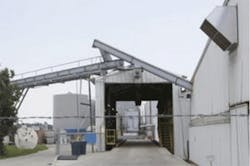OSHA Goes Alpha on Omega, Says Welders Unaware of Toxic, Explosive Fumes Until Blast Kills Worker
Two temporary workers hired to cut and weld pipes at the Omega Protein plant in Moss Point, Miss., on July 28, 2014, had no idea that the storage tank beneath them contained methane and hydrogen sulfide gases and they had no training about the explosion hazard associated with those gases.
One of the two men found out later as he lay in a hospital with a fractured skull, internal injuries and broken bones. The second, a 25-year-old man named Jerry Taylor, died when the tank exploded.
An OSHA investigation determined that four companies violated safety regulations that could have prevented the tragedy. The companies are Accu-Fab & Construction Inc., Omega Protein and JP Williams Machine & Fabrication, all in Moss Point, and Global Employment, in Pascagoula, Miss.
“The Omega Protein plant explosion shines a spotlight on how critical it is for employers to verify, isolate and remove fire and explosion hazards in employee work areas," said Eugene Stewart, OSHA's area director in Jackson, Miss. "If the employer ensured a safe environment, this tragic incident could have been prevented."
Accu-Fab, a metal fabricator, was contracted by Omega Protein to manufacture and erect a wastewater storage tank that required modification of existing pipes. A staffing agency, Global Employment Services, provided Accu-Fab with the employees needed at Omega. JP Williams Machine, which provides industrial service and repair, was on-site the day of the explosion performing unrelated maintenance activities.
OSHA issued 13 citations to Omega Protein, a producer of omega-3 fish oil and specialty fish meal products, for willful, repeated and serious safety violations. The company received a willful citation for allegedly exposing employees to fire and explosion hazards due to Omega management's failure to inform Accu-Fab that the storage tank contained wastewater that could generate hydrogen sulfide and methane gases, which can be highly explosive and toxic, even at low concentrations. The repeated violations involve not having standard railings on open-sided floors and platforms and failing to label electrical boxes properly.
Omega Protein was cited previously for these same violations in 2012. Additionally, the serious hazards included allowing workers to weld and cut piping on an improperly prepared storage tank containing explosive methane and hydrogen sulfide gases and failing to label or tag the storage tank to note that it contained hazardous chemicals.
OSHA cited Accu-Fab for one willful, four serious and two other-than-serious violations. The willful violation was issued for failure to train workers on chemical hazards in the work area, such as hydrogen sulfide, methane, welding gas and paints. Global Employment Services was issued a serious citation for this same hazard. Additionally, both employers were cited for a serious violation for failure to instruct employees about avoiding unsafe work conditions.
Accu-Fab also was cited for failure to ensure employees working on top of a storage tank at heights of up to 29 feet were wearing fall protection and for not recording this fatality or two other recordable injuries.
JP Williams was issued one serious citation for improperly storing oxygen and acetylene cylinders. Exposure to acetylene can cause headache, dizziness, asphyxiation and even frostbite.
Proposed penalties for the four companies total $187,620.
OSHA has conducted 13 inspections at Omega Protein facilities in Mississippi, Virginia and Louisiana since 1998. The company received citations for noise exposure, personnel protective equipment, machine guarding, welding and cutting and electrical hazards. Accu-Fab has three prior OSHA inspections, most recently in 2002, and has been cited for scaffolding, forklift, welding, cutting and electrical violations. Both JP Williams and Global Employment have no prior OSHA inspection history.
The companies have 15 business days from receipt of their citations and proposed penalties to comply, request a conference with Stewart or contest the findings before the independent Occupational Safety and Health Review Commission.
About the Author

Sandy Smith
Sandy Smith is the former content director of EHS Today, and is currently the EHSQ content & community lead at Intelex Technologies Inc. She has written about occupational safety and health and environmental issues since 1990.
